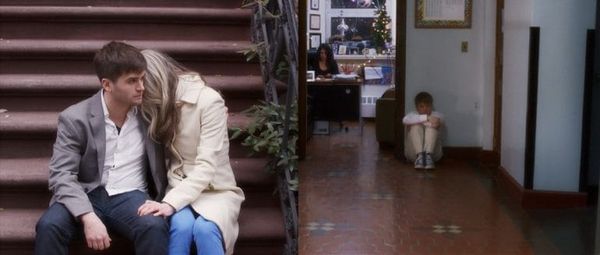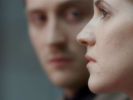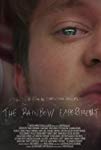Eye For Film >> Movies >> The Rainbow Experiment (2018) Film Review
The Rainbow Experiment
Reviewed by: Jennie Kermode

Matty (Connor Siemer) is the only one who knows what really happened. He knows because he's travelling back and forth in time, exploring and untangling complicated threads. Nobody can see him, however; nobody ever listened anyway. All they see is a body in a hospital bed, burned face swathed in bandages. Matty is in a coma. But who's to blame?
An experimental film with the drama fairly evenly divided between 36 different characters and the screen intermittently divided into four different sections, Christina Kallas' second feature plunges us into the busy school environment as if we were new teachers or pupils frantically trying to get to grips with the social order and learn who everyone is. At first it's disorientating, a little frustrating. but important threads gradually cohere and it becomes apparent that the superficially disparate things we're seeing are all interconnected, all critical to an understanding of what has happened or what is happening as a result of it.

Part mystery, part soap opera, part critique of how adults understand and interact with young people, The Rainbow Experiment bites off a silly amount and manages to chew most of it with gusto. Like many an intellectually ambitious film it is sometimes a little too dry, making it hard to engage with, but any parent will be able to connect with the sense of horror when an announcement goes out that there has been a serious incident and no details will be given until later. Likewise the trauma faced by the teacher in charge when the accident happens, and the tensions that emerge between staff members, provide the film with some dramatic meat.
David Sharples' stark approach to lighting perfectly captures the atmosphere of a busy New York school and there's some really good sound mixing by Pierre-Henri Bazin, subtly conveying the background noises inherent to such environments. Kallas' disjointed framing may annoy some viewers but nicely complements the thematic focus on differences of perception. Sometimes we find ourselves watching the same scene from different angles, invited to pick up on different things. Sometimes we watch a conversation at the same time as we see what a character is thinking about; sometimes scenes taking place at the same time point to the way events are destined to intersect.
Just like in the real world, the truth is complicated. Matty's explication of this may seem a bit patronising but the film is clearly intended to be accessible to youth audiences, where it's likely to be less of an issue. This may also explain the epilogue which weakens an abrupt and punchy ending. There is plenty here to appeal to adults as well, however, and the film is a fantastic showcase for Kallas' talent.
Reviewed on: 05 Dec 2018
















